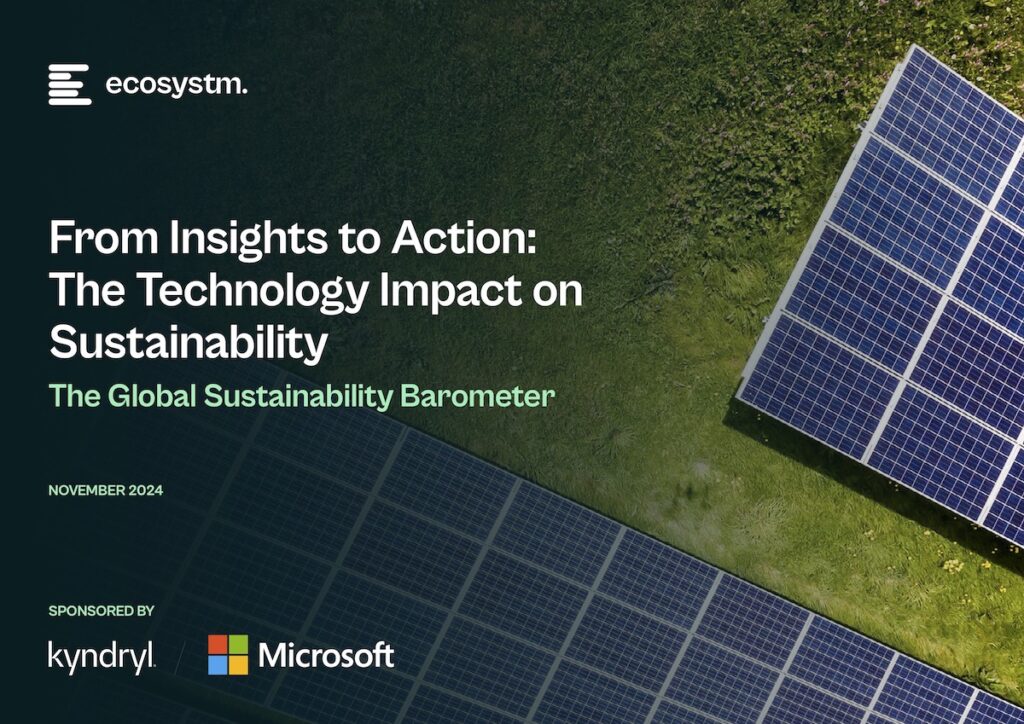Microsoft and Kyndryl Study: Only 21% of Organizations Leverage Technology for Sustainability Goals

- Technology Gaps in Sustainability: Only 21% of organizations globally use technology to reduce their carbon footprint and advance broader sustainability strategies, despite 84% acknowledging the strategic importance of sustainability: Microsoft, Kyndryl Study
- AI’s Underutilized Potential: While 62% of organizations employ AI for energy monitoring, only 37% use predictive AI for future energy needs. This reveals significant opportunities for enhanced data integration and proactive strategy development.
- Leadership and Data Integration: 55% of businesses incorporate sustainability goals into reporting, but only 19% use data strategically for decision-making, highlighting a disconnect that impacts broader transformation efforts.
Data and AI are becoming essential drivers for action and future risk prediction. A recent study by Kyndryl, the world’s leading IT infrastructure services provider, commissioned by Microsoft and conducted by Ecosystm, reveals that while sustainability holds strategic importance for 84% of organizations, only 21% leverage technology to achieve these goals and reduce environmental impact.
Faith Taylor, Chief Corporate Citizenship and Sustainability Officer at Kyndryl, emphasizes the urgency for actionable strategies:
“As the world faces increasing climate-related challenges, businesses are under pressure to act decisively and place sustainability at the forefront – and this year’s Global Sustainability Barometer study highlights that organizations must move from intent to collective action to drive change.”

Technology and Sustainability Integration
The study underscores the critical role technology can play in shaping sustainability strategies, turning aspirations into actionable plans. While 55% of organizations report integrating sustainability initiatives into existing processes, just 19% fully utilize data for strategic planning.
Matthew Sekol, Sustainability Global Black Belt at Microsoft, points out,
“Companies can gain the insights needed to deliver on their commitments and drive resilience by integrating sustainability data with operational and financial data, and using traditional data analytics and robust AI tooling to reshape operational efficiencies and foster sustainable innovations.”

Leveraging AI for Enhanced Impact
AI’s potential is evident, with 55% of leaders recognizing its significant impact on sustainability goals. However, only 37% apply predictive AI to anticipate energy requirements. To maximize its impact, companies must integrate AI-driven scenario planning and climate risk strategies to adopt a more holistic approach to sustainability.
Ullrich Loeffler, CEO & Co-Founder of Ecosystm, notes the transformative possibilities:
“As organizations increasingly recognize sustainability as a strategic imperative, we’re witnessing a surge of innovation and collaboration. AI is at the forefront of this movement, empowering businesses to optimize resource consumption, reduce waste and drive positive environmental impact.”

RELATED ARTICLE: Microsoft Partners with Ebb Carbon for Up to 350,000 Tonnes of CO2 Removal
Recommendations for Future Action:
- Make technology core to strategic planning: Integrating data and IT infrastructure to reduce environmental impact.
- Reframe AI’s role: Shift from mere monitoring to predictive and proactive sustainability management.
- Integrate disparate data: Use unified data for comprehensive business transformation, ensuring informed decision-making.
Despite progress, only 35% of organizations consider the energy implications of their AI solutions. To address this, Kyndryl and Microsoft propose strategies for emission measurement and AI optimization, aiming to harness technology in ways that drive sustainability without compromising on innovation.
As businesses strive for sustainability, leveraging technology, especially AI, can create significant advancements. Collaboration and innovation remain key to transforming intent into tangible environmental benefits.













